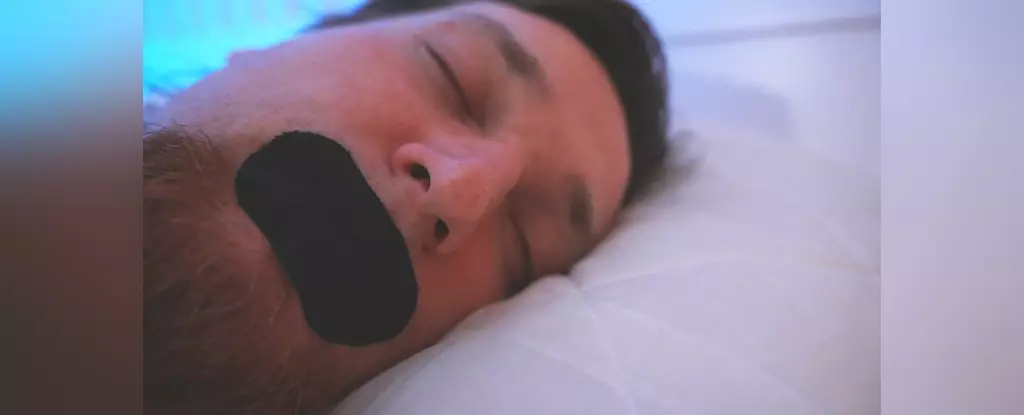In the age of social media, where health fads can sweep the globe overnight, a new contender has emerged: mouth taping. This odd practice, championed predominantly by TikTok influencers, promises a myriad of benefits ranging from improved jawline definition to enhanced sleep quality. However, amidst the hype lies a web of unsubstantiated claims and potential health risks that should raise serious red flags. It’s unsettling how easily people are swayed by a catchy trend, often overlooking the scientific rigor necessary to validate such interventions.
The Allure of Simple Solutions
The convenience of a simple ‘fix’ taps into a deep-rooted desire within us: the quest for optimal health and well-being without the fuss. Taping one’s mouth during sleep is marketed as an easy way to address mouth breathing, snoring, and even obstructive sleep apnea. Yet, it’s critical to understand that this surface-level approach neglects the actual root causes of these issues. For many, mouth breathing is not merely a habit or an inconvenience; it often indicates an underlying anatomical or medical condition. By focusing solely on sealing the mouth at night, individuals risk ignoring the fundamental problems—such as nasal blockages or structural obstructions—that contribute to their sleep disorders.
The Science Says No
While advocates for mouth taping may point to anecdotal evidence from social media buzz, scientific research tells a different story. A thorough review of existing studies reveals an alarming lack of robust, reliable data supporting the efficacy of mouth taping. Many studies were criticized for poor methodology, including inadequate participant selection and lack of follow-up. Furthermore, clinical assessments of individuals suffering from severe cases of obstructive sleep apnea or nasal obstruction show that the practice may be not only useless but potentially hazardous. Taping shut a person’s mouth when they are unable to breathe optimally through their nose could lead to asphyxiation, a reality that cannot be ignored.
The Pitfall of Misinformation
Social media thrives on the sensational, where sound bites and flashy visuals often overshadow factual content. This phenomenon is particularly alarming in the realm of health, where misguided trends can lead individuals astray. The mouth taping fad exemplifies the dangers of unchecked health advice propagated through platforms designed to entertain rather than educate. When influencers with little to no medical training publish videos promoting simplistic solutions, it poses a serious risk to the public’s well-being. It’s essential to approach these trends with skepticism and discernment, demanding accountability from those who promote such potentially harmful practices.
Prioritizing Quality Care Over Quick Fixes
Rather than being seduced by superficial advertisements of quick fixes, individuals experiencing sleep difficulties should prioritize consulting qualified healthcare professionals. A comprehensive examination is necessary to determine the root causes of their issues, whether they be sinusitis, allergies, or structural abnormalities. A tailored approach involving medical interventions or alternative treatments is far superior to any trending hack from an influencer’s feed.
The Uncomfortable Truth
Mouth taping may seem like an innocuous trend, yet it masks a much larger issue at play—the prevailing culture that prioritizes convenience and simplicity over genuine medical understanding. As people increasingly grapple with sleep disorders in today’s fast-paced world, the urgent imperative is to foster a collective mindset that values informed decision-making. Solutions to health problems should not stem from viral TikTok trends but rather from credible research, sound medical advice, and thoughtful interventions. It is both concerning and revelatory that a society so enamored with wellness can easily fall prey to misguided shortcuts that could lead to detrimental health consequences. Knowledge and critical thinking should reign supreme over the seductive pull of superficial solutions.


Leave a Reply